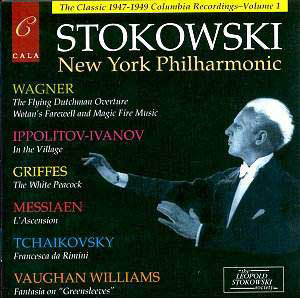Stokowski’s path following his departure from Philadelphia
was a curious one. Various short-term appointments with a variety of
orchestras led to some recording activity – but sharing the NBC with
Toscanini was a study in contrasts bound to end badly. For a while though,
before it too soured, Stokowski enjoyed a strong position as Guest Conductor
of the New York Philharmonic making a series of important recordings
between 1947 and 1949 – barring 1948 when a recording ban was in force.
This is Volume One of the Columbias – a companion volume CACD 0534 concludes
them. The recordings, as ever with Stokowski, are an idiosyncratic selection;
the discs he made with the group known as his Symphony Orchestra were
equally so – "from Gabrieli to Grainger" as sleeve note writer
Richard Gate felicitously puts it.
No real thread runs through the discs. A commitment
to the work of contemporaries, the desire to foster native American
talent, an interest in things Slavonic and in Wagnerian syntheses are
however some of the imperatives Stokowski demonstrates. His Wagner is
powerful and resilient; the Flying Dutchman overture is but for
some poor wind chording – which stopped its release at the time, though
it’s subsequently appeared on LP – an impressively sonorous affair with
powerful brass to the fore. The Stokowski-arranged excerpt from Die
Walküre was something of a fixture for him – recordings of
the Magic Fire Music at least date from 1921 and 1939 (both Philadelphia),
Houston from 1960 and the RPO from 1973. I can imagine it won’t be to
all tastes but Stokowski’s Wagner was impressive on its own terms; the
various utilitarian syntheses he propounded over the years are really
no substitute for the Stokowski led operas that we lack but they are
all that remains. The Ippolitov-Ivanov is evocative and descriptively
charming and clearly a reminiscent piece for Stokowski. He’d conducted
it at his debut concert in 1909 and later recorded it in Philadelphia
in 1925.
Messiaen’s L’Ascension was a first recording
and a work he returned to with the LSO in 1970 – the differences are
instructive. He is delightfully powerful in the third of the four Symphonic
Meditations and incisively so in comparison with the later LSO recording,
where he adopted a more leisurely tempo, as indeed he does for all four
movements, sometimes dramatically so, as in the case of the first Meditation.
But there is something undeniably magnificent in the way he spins the
languorous violin line in the final Meditation in the New York
recording. Stokowski gave the world premiere of Griffes’ The White
Peacock in Philadelphia in 1919. Its effulgent impressionism is
grist to Stokowski’s mill, its accelerandos and the rise and fall of
its syntax encouraging supple string phrasing and wind playing of great
precision and refinement. The Fantasia on Greensleeves was a
filler to Stokowski’s celebrated recording of Vaughan Williams’ Sixth
Symphony – the Fantasia is slightly abridged but the string layers
are characteristically Stokowskian. Francesca da Rimini is another
example of the conductor’s Tchaikovskian affinities, subsequently recorded
with the Stadium Symphony Orchestra in 1958 and again with the LSO;
vital, dramatic, with some cuts it might strike some as too forceful
but it is splendidly clear and decisive.
This is the first time these recordings have been available
on CD. The Messiaen makes a potent and constructively direct point of
comparison with the later Stokowski recording and the Griffes is a piece
associated with him, brief though it is. Proselytiser, synthesiser,
occasional tyrant, there’s never a dull moment with Stokowski.
Jonathan Woolf


